Tom King teases bigger mysteries, more JLI in the "very sexy" Human Target
The writer talks about wrapping up the first half of the murder mystery with Human Target Book Six, plus a preview of its first 8 pages
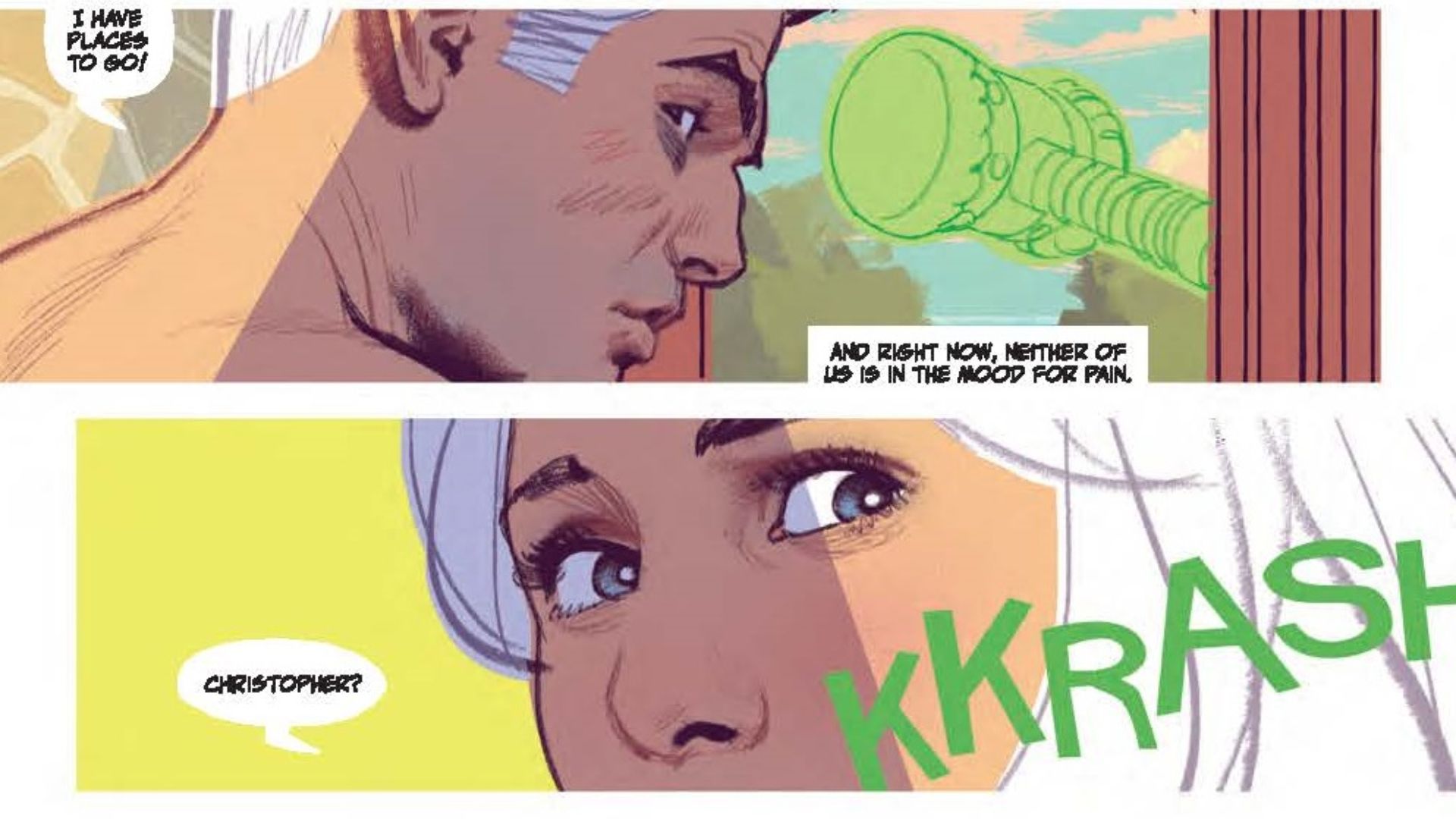
In all of DC history, few characters have gone from obscure to A-list faster than the Human Target.
Christopher Chance's Black Label 12-Book whodunit adventure is drawn and colored by Greg Smallwood and written by Tom King, who'd be the first person to tell you Smallwood's name should go first.
The full-color noir detective story finds Chance solving his own accidental murder, as he's been poisoned by someone attempting to kill Lex Luthor.
Before the release of Book Six on March 22 that concludes the first half of the story and marks a five-month break before the series resumes in September, Newsarama sat down with King to discuss his inspirations, his work with Smallwood, and of course, the mystery of who killed Chance.
Oh, and because Human Target is a DC series, if and when Batman shows up ... (he does!)
Plus you get to look at and read the first eight pages of Smallwood's spectacular art...
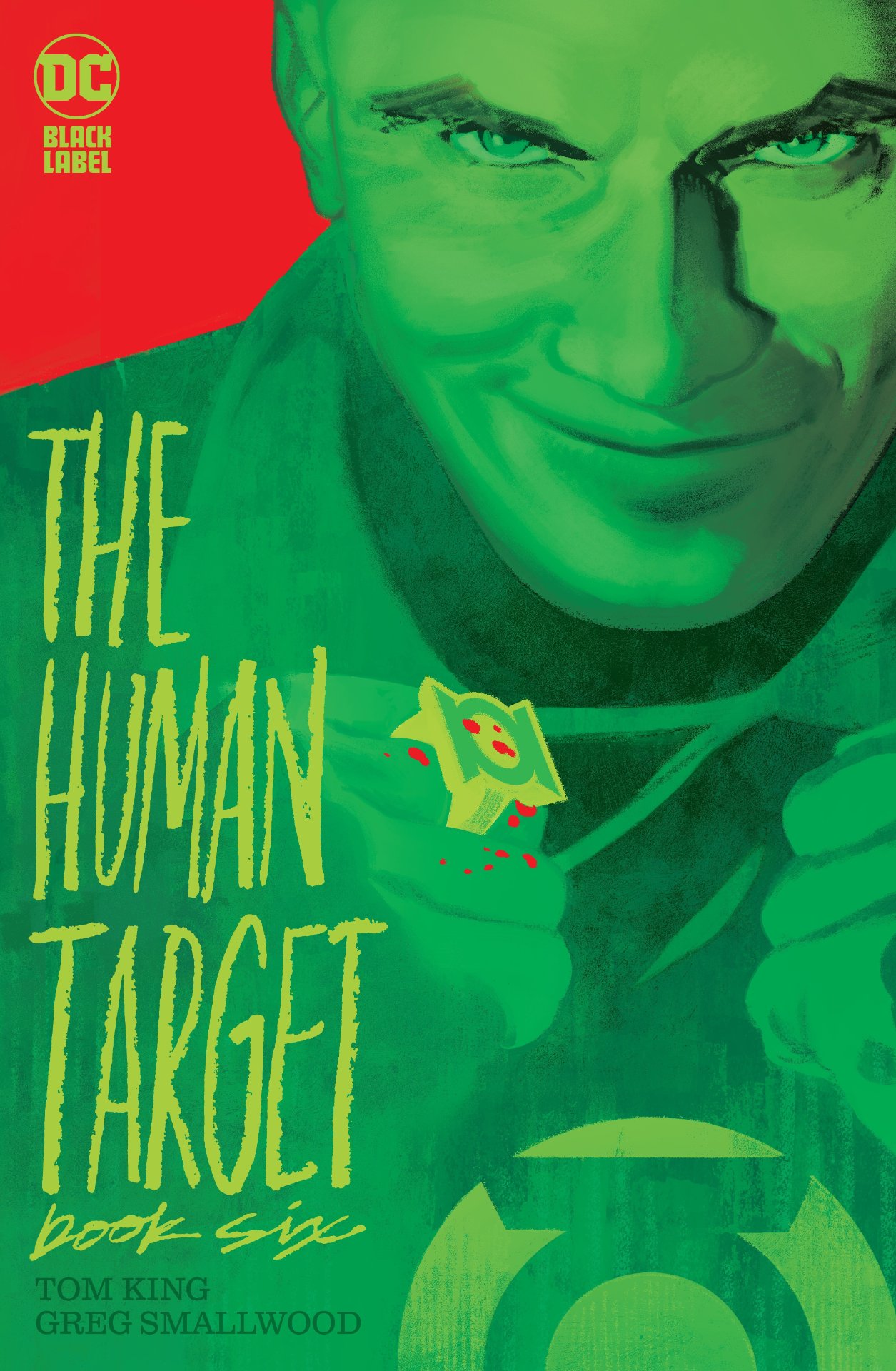
Newsarama: Tom, every issue of Human Target has been given a title that comes from a monologue in William Shakespeare's King Lear. What does Christopher Chance have to do with King Lear?
Comic deals, prizes and latest news
Get the best comic news, insights, opinions, analysis and more!
Tom King: That's one of those things where I feel like, if I explain it, I will rob it of its magic. In that way, it's similar to the end of Mister Miracle. When you make references like that, you try to commune with your audience, so that they'll investigate it and see what it is and make their own connections. If I say all that it is to them, I take away their investigation instead of meeting them in the middle. That's where literature should happen, between the audience and the work.
Nrama: Fair enough. So your answer is to wait and find out for yourself?
King: Yes.
Nrama: Great. So let's move on to the beginning of Book Six, which begins with Christopher Chance, the Human Target, arguing with his romantic interest, Ice. How much should we be trusting Ice at this moment?
King: You should trust her as much as Chance does, which is to say not at all. What I like about the book is that you fall in love with ice while you still don't trust her. That's the key to the whole book. I'm trying to get the audience to think "I don't trust her but I'm still in love with her" which is what Chance is doing. Because those things can exist at the same time which is a bizarre state of humanity that you cannot really love someone and not know if they're lying to you.
But no, you shouldn't trust Ice, you shouldn't trust Fire, you shouldn't trust Blue Beetle, you shouldn't trust anyone. One of the people you see in Book One, where we recreate that iconic Justice League International splash page, is the killer. They tried to murder Lex Luthor and missed. So you shouldn't trust anyone. At any point.
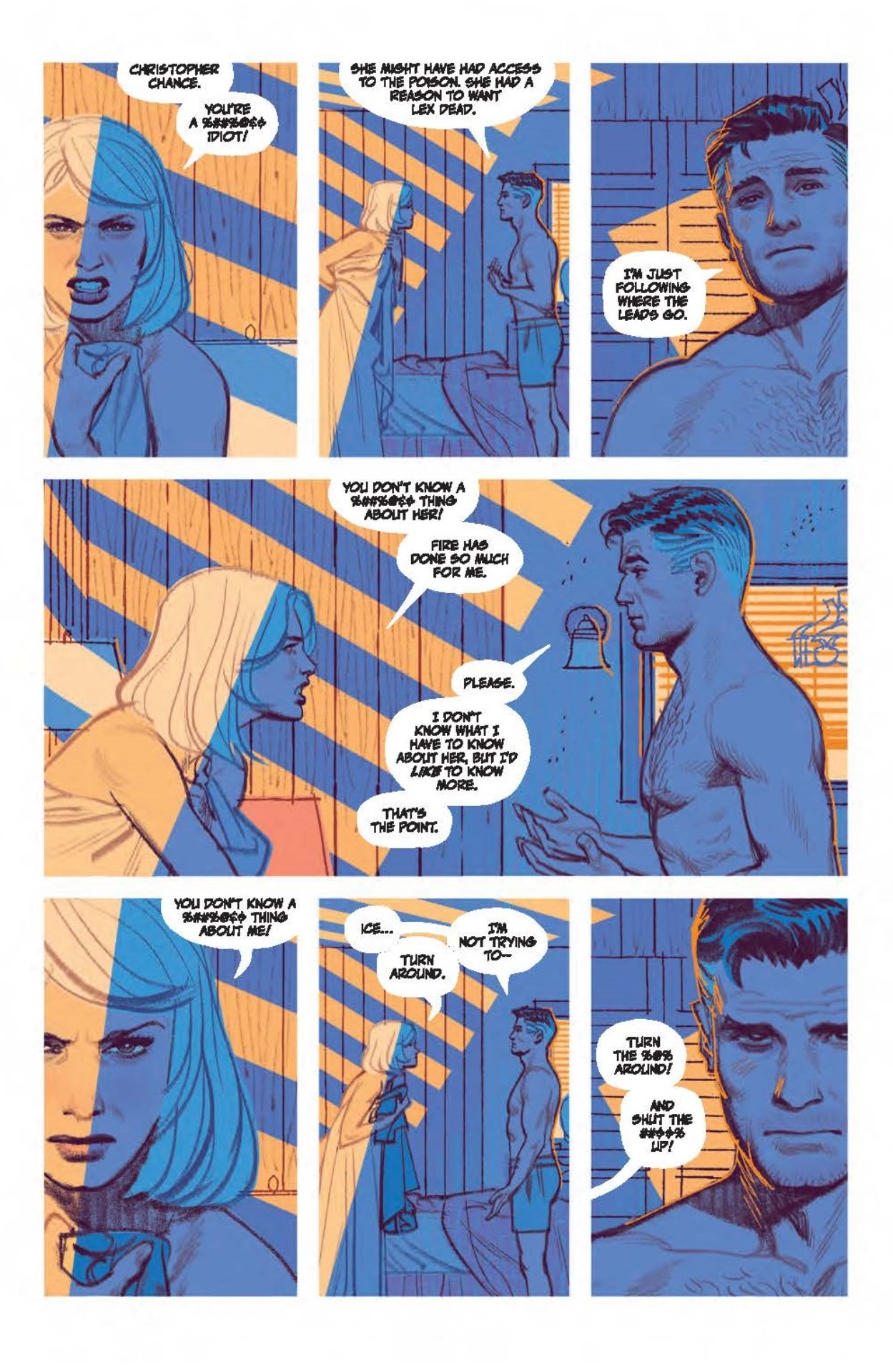
Nrama: Not even Doctor Mid-Nite?
King: He's not on that splash! So he's ok.
Nrama: That's true. I'm glad, because it was really going to rip my heart out if it turns out to be him. So in this book, Doctor Mid-Nite is a man of faith.
King: Yeah. That's established in Geoff Johns' JSA. There was a running theme that Mister Terrific, who I wrote into Strange Adventures, was an atheist and that Doctor Mid-Nite was a believer. They had this running commentary going, so that's a call back to some early 2000s DC Comics.
Nrama: Why was it important to you to have a religious character in this book?
King: Human Target is about a guy approaching his own death, his own mortality. That's essentially the book. You see him die on page two or three of the first issue. So there's this question of how he is spending his last days. A person who doesn't have faith has a different perspective on that question than someone who does, someone who believes that this life is a preview or a reflection of a more transcendent world.
I wanted to put that into contrast into Chance's life. On an existential level, he does not believe in another world. So you get this question, like Sartre and Camus asked, which is; when you throw away the idea that there's a paradise waiting for you on the other end of this life, how do you live? That's the essential question of early '40s' existentialism. That's in the book and I'm putting that contrast in there.
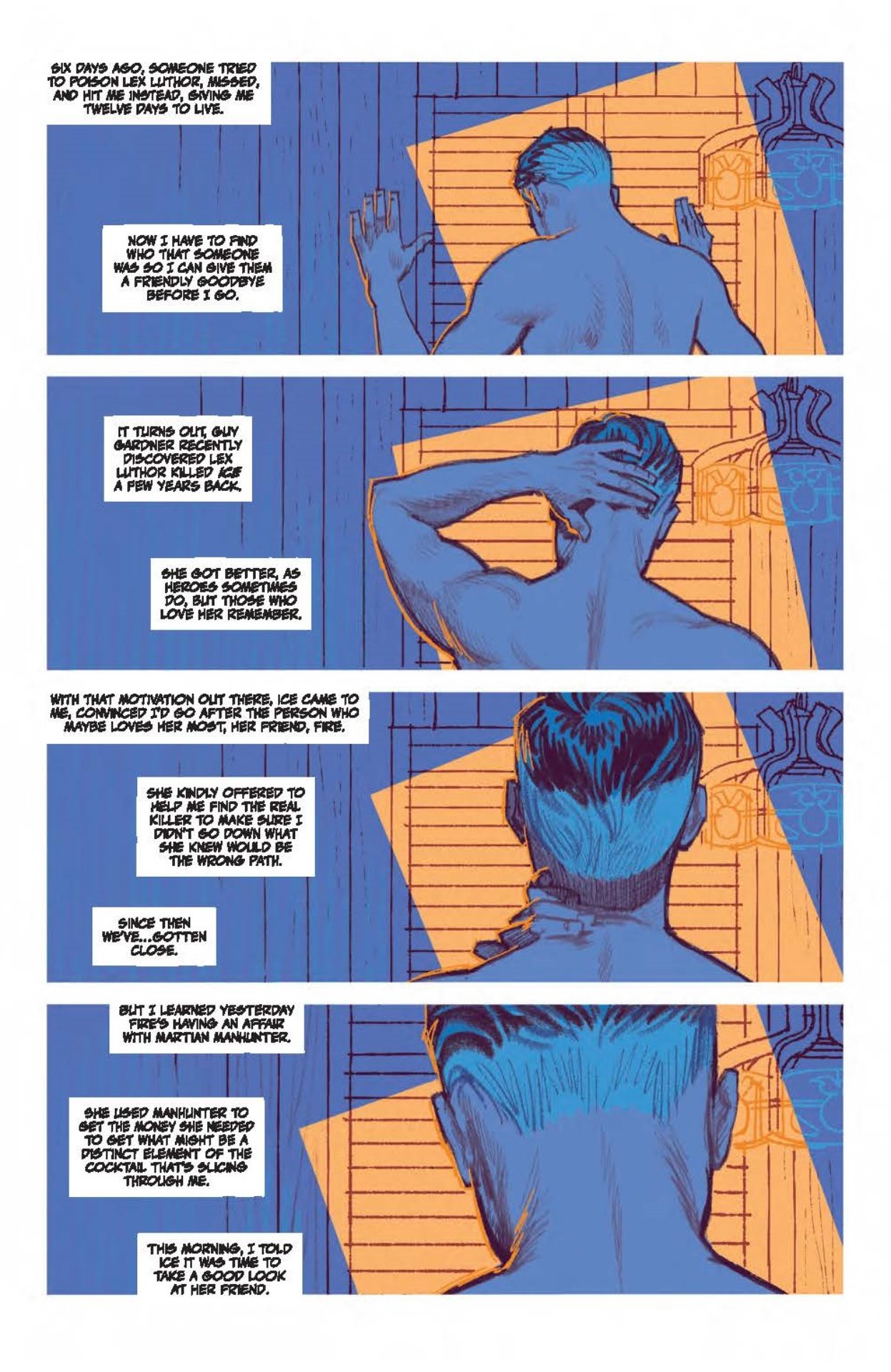
It's also personal to me because my brother is a reborn Christian. He works for the church, that's his entire life. He has no doubts about anything that's coming in this next world, how the metaphysics of it add up or how it's all told in the Bible. And as I watch him live his life as opposed to mine, which is full of doubts and anxieties, I wonder which one of us is fooling the other.
Nrama: That brings up a great point about Chance. His internal monologue throughout so much of the comic is him asking "Why am I not just living the life I have left? Why am I not just enjoying it?" So what is it that drives Chance to solve this murder? Does he just want revenge?
King: That's part of the mystery, and this kind of comes back to the King Lear speech about revenge and what it's worth. The surface mystery here is "Who killed me?," but the mystery underneath that is "How do I spend my days?" These two mysteries are simultaneous to each other. The mystery of who killed me is an awesome one, you want to find that out. But finding out how you spend your days is kind of revealing to yourself who you are.
Every one of us faces this dilemma every day. We're living our lives and thinking "if this is the one shot I have, why am I doing this? Why am I going to this job I don't like? Why am I at this event that I don't want to be at? I'm obviously here for a reason and I'm not leaving, so what does that say about me and my choice?" Sometimes you understand that and sometimes you don't. Sometimes you take actions that you understand. Sometimes you don't.
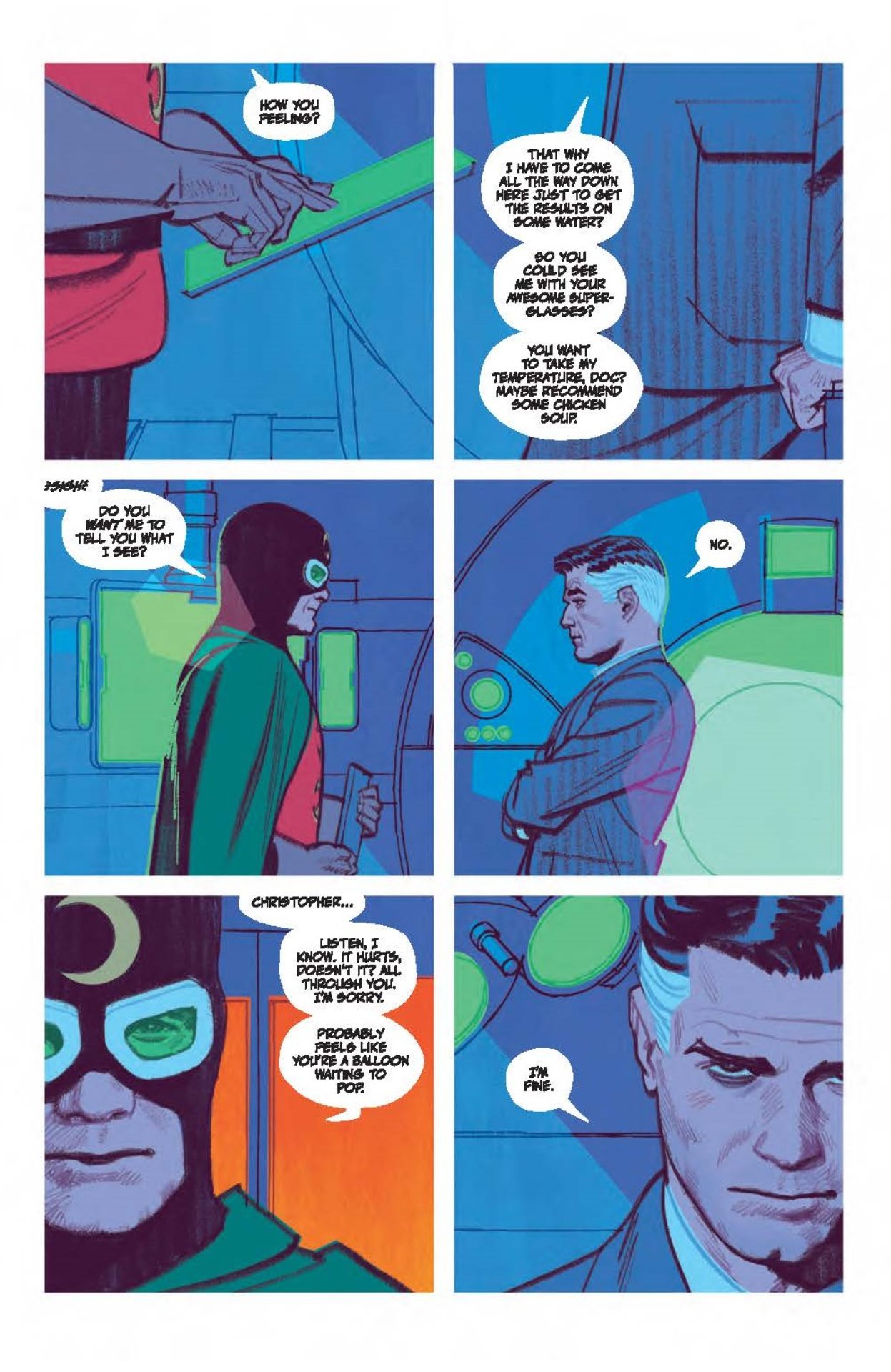
And that's where Chance is. He's completely driven by revenge but he doesn't understand why. He wants something better but he keeps taking steps in the opposite direction. It's because he doesn't completely know himself. When death stares you in the face, the first thing you wonder is whether you knew yourself before you died.
[Laughs] I feel like this is getting too deep. This is a book about punching! It's very sexy.
Nrama: It is very sexy! Flipping through these pages is unlike anything else in comics today. One of my favorite things about this book is how it sprinkles visual clues throughout. For example, in Book Three there's one panel in which you see Booster Gold shaking someone's hand. And you see his Legion ring. But in the very next panel, he's waving with the same hand and you don't see the ring anymore. I won't spoil how, but it comes back in a very cool way. Where should we be looking for clues in Book Six?
King: There are clues left, right, and center. Generally speaking, you'll be figuring out the mystery as Chance does. Each issue kind of works like that. In the beginning, you learn something that will pay off in the end. Book Five is the epitome of this. At the very beginning, you have no idea what was going on, so you sit there watching salt move. But at the end, it's wrapped up and it makes sense.
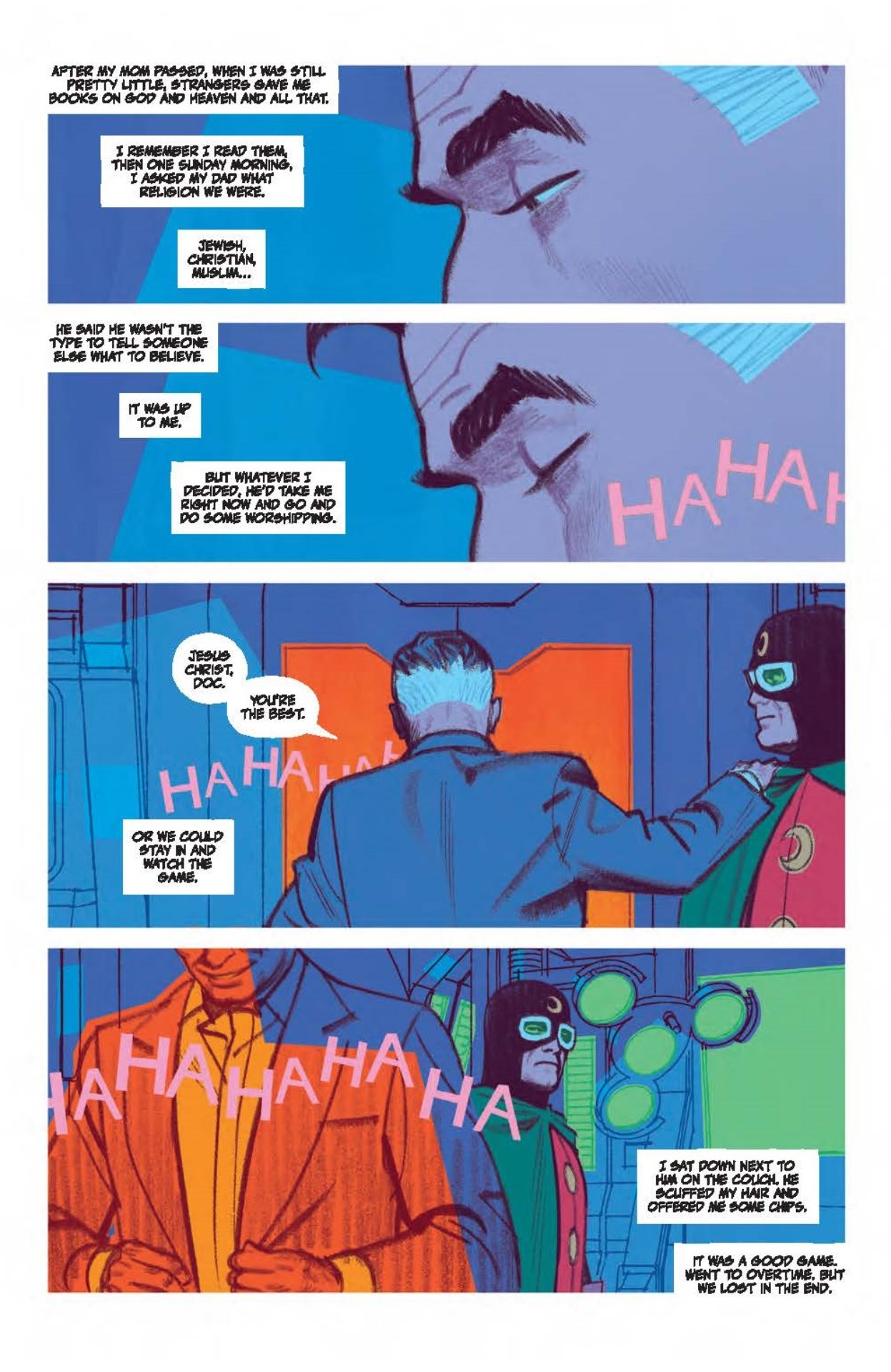
There are big things ahead like that. In Book 9 you'll see there's something missing from the whole issue. It takes Chance a second to realize it, but then at the end, you'll be like, "Oh, okay, the whole clue is what's missing from every picture."
Nrama: Can you talk about what that requires teamwork-wise between you and artist Greg Smallwood? What does your collaboration process look like?
King: This book is similar to working with Mitch Gerads on Mister Miracle or Gabriel Hernández Walta on Vision. I have so much trust in the artist that it's almost not teamwork. It's like playing spades or bridge; I know I'm with the best player so I can just play my best game.
I wrote this all a long time ago. I took a bunch of months off and wrote this as a novel, all twelve issues at once. Then I said to Greg, here are twelve issues of this series. You tell it how you want to tell it. Then Greg is so good he tells it the right way. We're over a year out from when I wrote it, so I'm getting back these pages and it's like I'm reading it for the first time. I told the story and then Greg brought it to life. I just completely trust him to do his thing. It's not a matter of teamwork, it's a matter of trust.
I just made a Spades and Bridge reference and I'm not really a player, so I hope that works.

Nrama: So there was no point in your collaboration that you thought maybe the killer is a different person? Maybe this is not what I thought it was when I started?
King: No, I got to do that stuff all on my own, before it went to Greg. It pretty much played out how I had it planned in my head from Book One. That's the benefit of writing it all at once. If you come up with something for issue twelve and it turns out you need to see it in Book One, you can go back and do that. That couldn't be the case when I was writing Batman. I'd have to write issue #3 and then issue #27 and issue #70 and so on, because it was a double shift and you were writing for four artists at once. Constructing it this way gives you much more freedom so that you can go back and add clues. But generally speaking, it flowed from A to B pretty easily.
Nrama: So you knew who the killer was even as you were starting the project?
King: Yep. I think [editor] Ben Abernathy asked me as I was pitching the book, "Who's the Killer?"
Nrama: Because editorial had to know that it wasn't Batman?
King: Hey, could be! I don't want to rule Batman out.
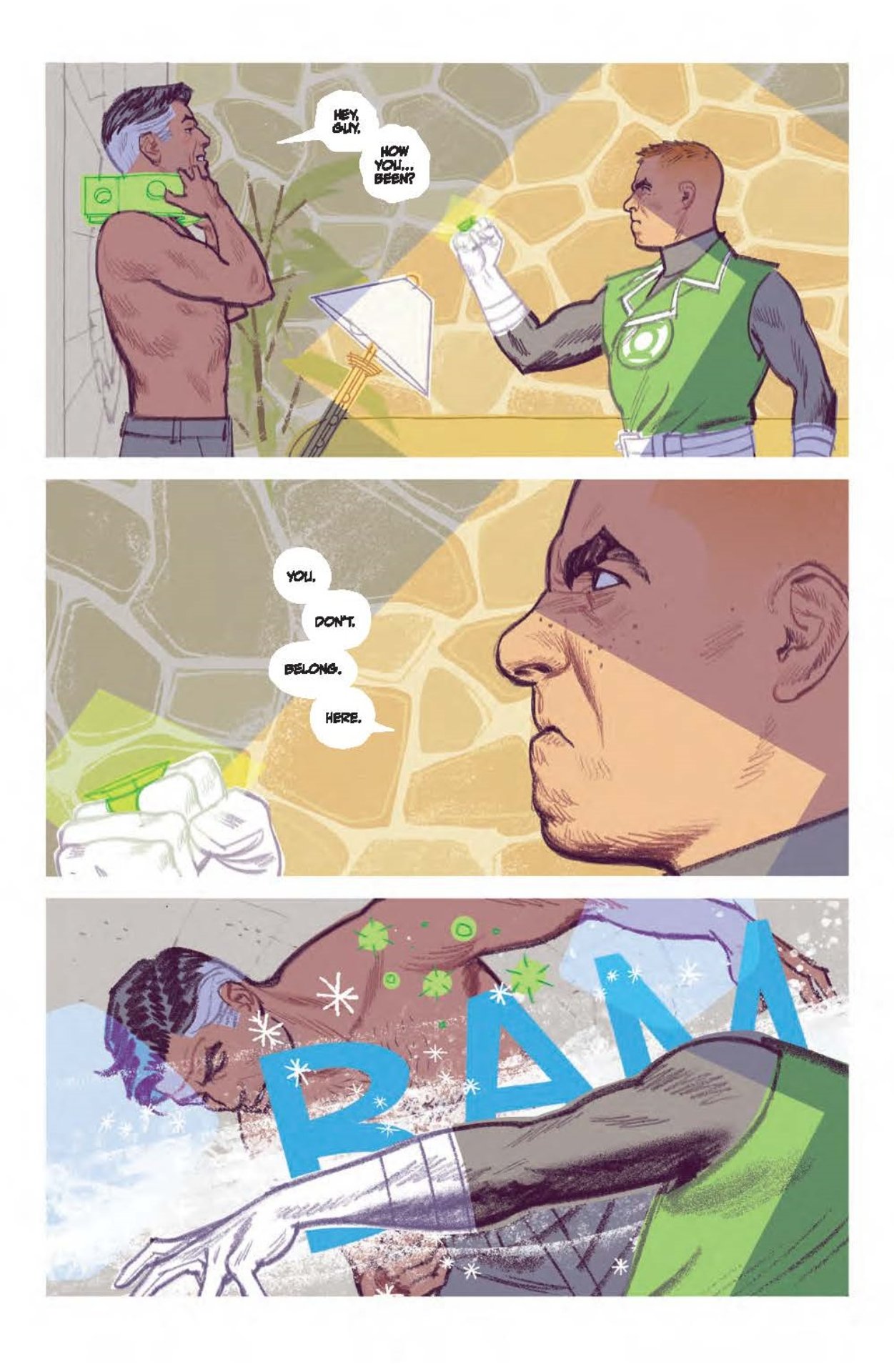
Nrama: He was in the JLI picture, that double-page spread.
King: He was. And he has a big role to play in an upcoming issue.
Nrama: Very cool. Ok, I want to go back to something you said earlier that I really liked. You said Greg tells the story in the right way. What do you mean by that?
King: When I first got this project, it was kind of a whim. I wasn't passionate about the Human Target. Then I got the first cover of the first issue, which is the cover you've all seen. He did that before I started writing, just as kind of a mock-up of what he was thinking. And I was like, "Oh." It all kind of clicked. It had a kind of Darwyn Cooke, Mad Men vibe but with a lot of Raymond Chandler and Dashiell Hammett thrown in. Plus all that deep Shakespeare and Sartre stuff that I was harping on about. I knew at that moment there was something special here. Greg does adjust my scripts, you know, I'll write a page and he'll adjust it. But he'll adjust it in the best way possible to make it better. He tells it better than I do.
I post my scripts online on my SubStack. They're not Marvel-style, they're full script but they are sparse. Panel one will be Chance and Ice on a bed, panel two will be Chance looking at Ice. Greg has to know how he's going to draw this bed, how he's going to put the angle of the camera, how he's going to cut away. He just picks the right shot. One of the many talents artists have is that they're great cinematographers. And Greg's the best cinematographer. He knows where to put the camera and set the lighting to just extract the emotion from the scene.
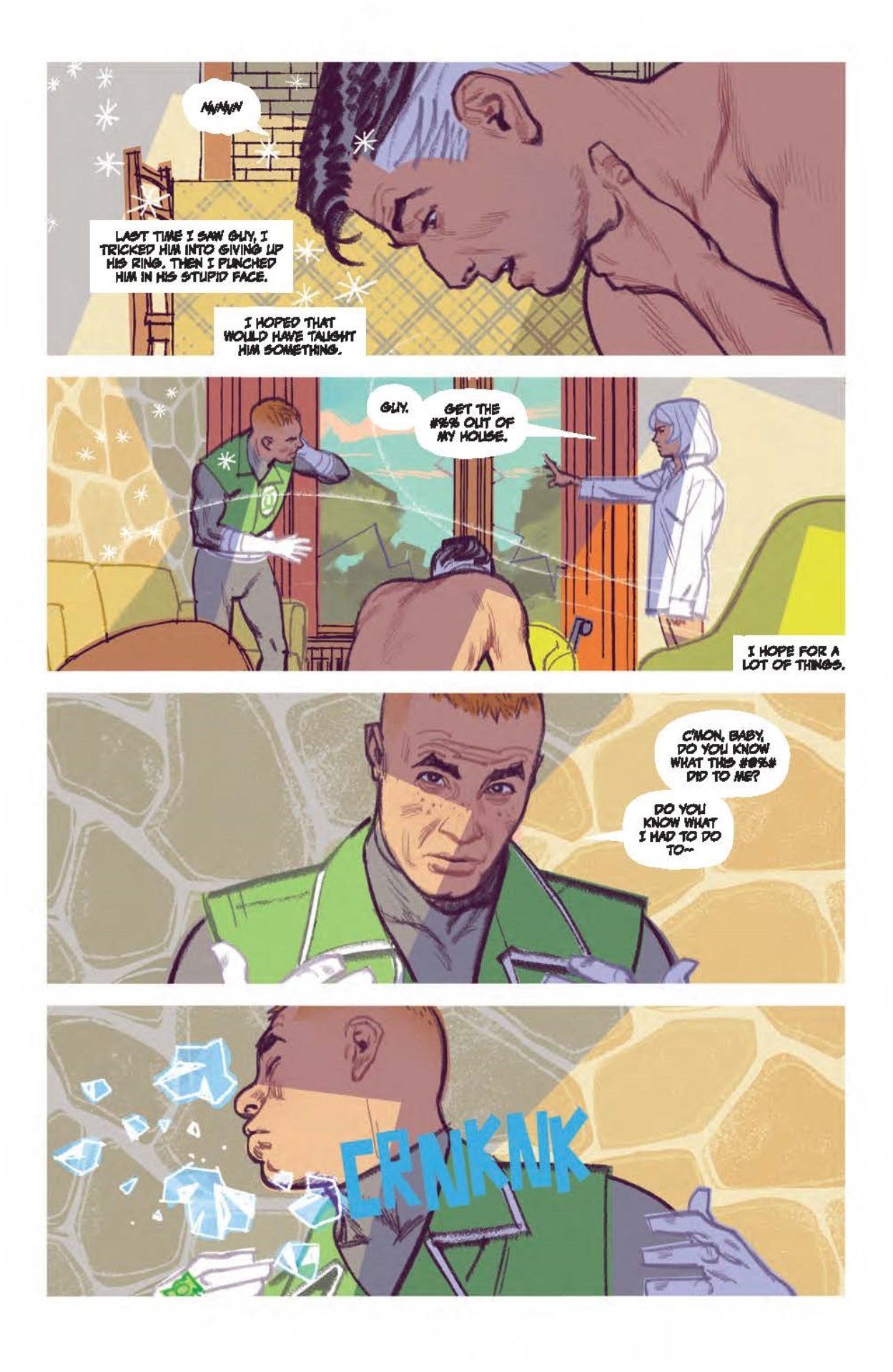
This is the first book I can think of, and I've worked on a lot of comics, where the selling point from day one was, "Come for the art, stay for the story." Other stories that I've done, the selling point is kind of "Here's what Batman is going to do and it'll be a great story and the art will be amazing." But this one has been advertised as, "Come for the art, stay for the story." It was the right way to market it because the first thing it does is be beautiful.
Nrama: You said going into this that you didn't have much of a passion for the Human Target. I assume that, now that you have written this book, your relationship with that character has changed. What was the moment that clicked for you?
King: Well first, I should say that this really is the brainchild of Ben Abernathy. He was the one that plucked this character out of nowhere and asked me to pitch a story with it. He pulled Greg onto the project. Any success this book has, he deserves a ton of credit for.
But to answer your question, there is a line in the first issue that I really like. There's a scene where Chance is talking to Lex Luthor and Lex is kind of "alpha dogging" him. He's saying, "I'm king of the world." And Chance is kind of like, "Yeah you're the king. What the f*** do I care?" He's so nonchalant.
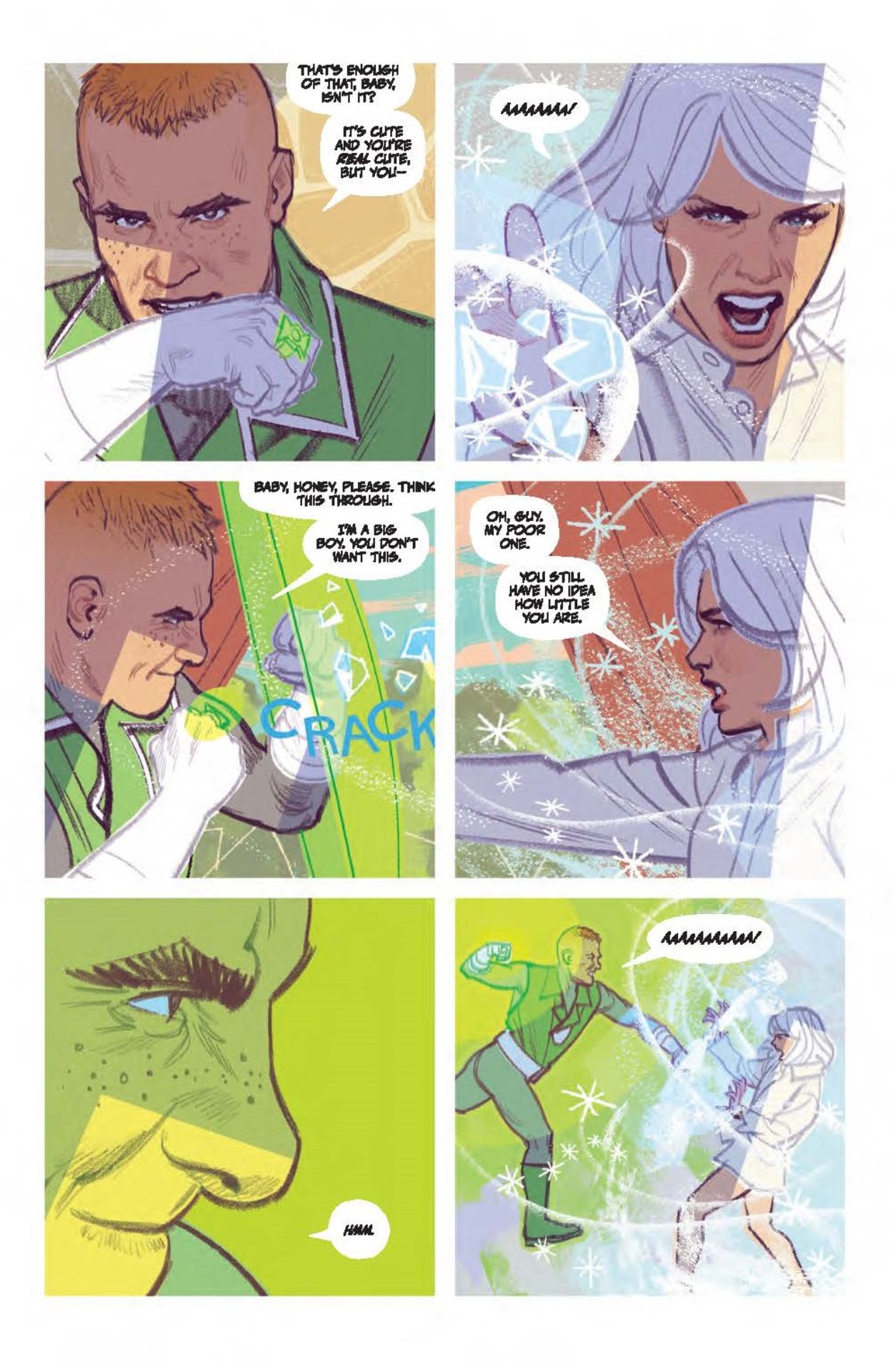
I'm an old movie fan, so I based Chance on one of my favorite performances, which is Dick Powell in Murder My Sweet. He plays Chandler's classic detective, but he plays him kind of differently. Dick Powell was this song and dance man a long time ago. He was Mr. Handsome Dancer in the '30s. But in the '40s, they brought him back and he's been smoking four packs of Lucky Strikes a day, but he still has this ballet dancer quality in his performance. I really love that, so I put that into Chance.
I write a lot of characters. I've written Batman, Superman, Mister Miracle. Chance is the first guy I've written who is just… cool. And that's what I realized. I realized I like this guy, he's cool and I want to be more like him. When I get an issue back, I always write to Ben that I know the issue succeeds if I end it thinking, "I want to be Chance when I grow up."
Nrama: I think we all do. Now, Book Six is special because Human Target is a twelve-issue series, and it will conclude the first half. You could say this is the end of the first "season." What can you tease will happen In the second season?
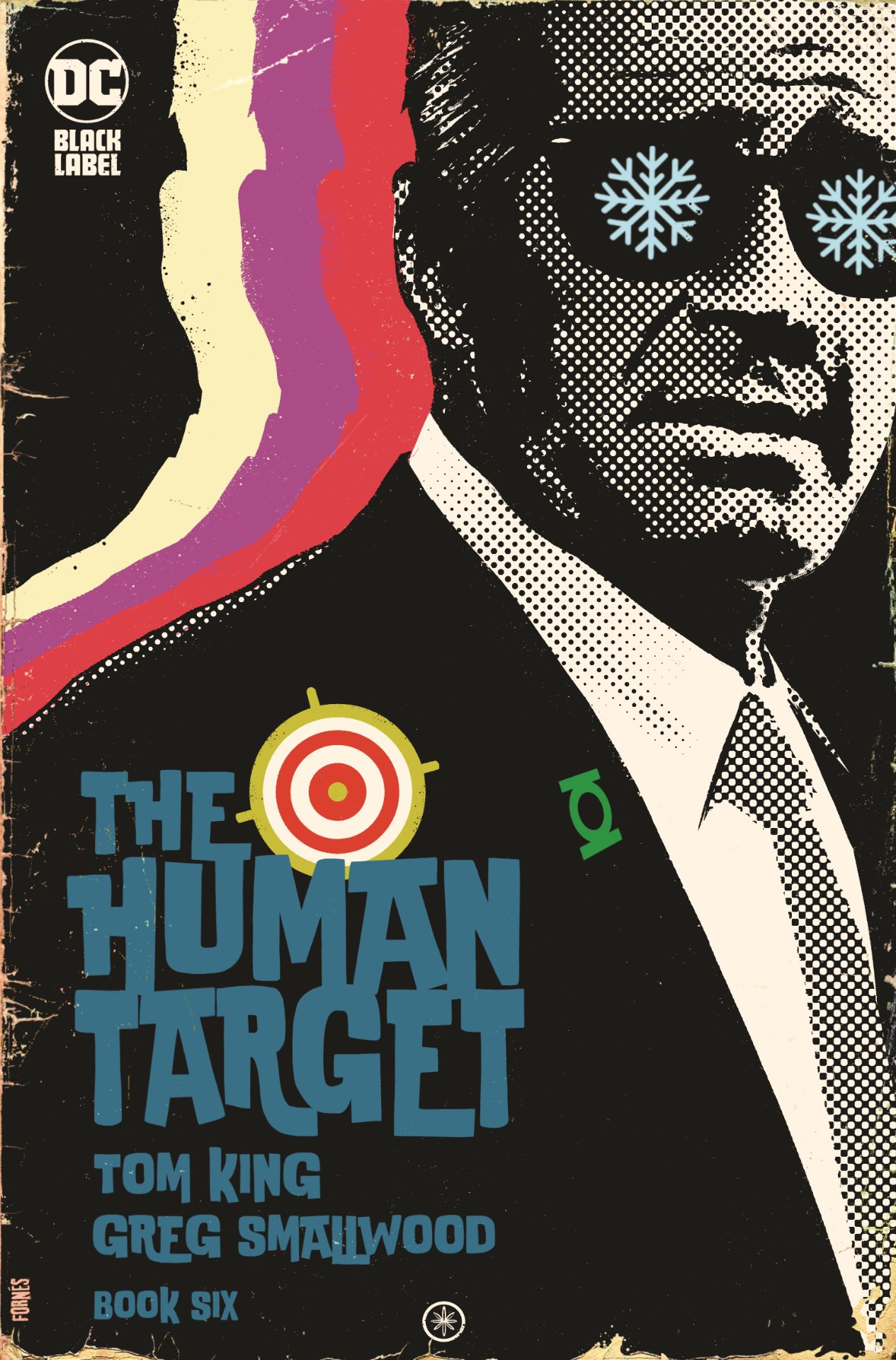
King: Once people read Book Six, you'll know something's different. There's a big moment that happens in Book Six. This whole time, Chance has been going along with where the story takes him. He's not a passive character but he is learning. But then in Book Six, he does something which changes the dynamic of the story. It's going to play a big role in the story going forward. Then it's not going to just be about him solving the mystery, it'll be about an action he took during the solving of the mystery. Which has big effects on a ton of stuff in the DCU. So the second half is kind of a completely different dynamic after that huge moment in Book Six.
Nrama: Alright, one last question for you. Was that [redacted] at the end of Book Six? Does Chance have a previous relationship with her?
King: Yes. Each issue revolves around a suspect. Book Two is Ice. Book Three is Booster. Book Four is Beetle. Book Five is Martian Manhunter. Book Six is Guy Gardner. And Book Seven will be her. She's next.
Human Target Book Six goes on sale March 22nd.

Grant DeArmitt is a NYC-based writer and editor who regularly contributes bylines to Newsarama. Grant is a horror aficionado, writing about the genre for Nightmare on Film Street, and has written features, reviews, and interviews for the likes of PanelxPanel and Monkeys Fighting Robots. Grant says he probably isn't a werewolf… but you can never be too careful.


